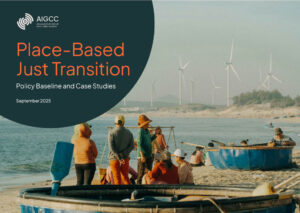24 September 2025 – Asia’s emerging markets face more significant challenges than developed markets in the same region in equitably transitioning to low-carbon economies.
They need to broaden access to electricity while also reducing carbon emissions and upgrading energy systems.
This, along with lengthy institutional lead times, underscores the urgency for investors and policymakers in Asia to account for social transition risks in their investment frameworks and policies, according to AIGCC’s latest research.

Download the full report
AIGCC CEO, Rebecca Mikula-Wright, said: “We encourage investors in emerging markets to include just transition planning in their sustainable investing frameworks. This should start as early as possible; well before a region reaches peak emissions.”
Key issues for a just transition have shifted from the job losses in fossil fuel industries to one that includes sectors that are also scaling up. These issues span across social, economic, and environmental realities of specific regions, including informal employment, decent work, wage parity, community consultation and consent mechanisms, migration and displacement, as well as social protections.
More Asian markets are making high-level commitments to inclusive and equitable transitions. However, they are still at various levels of planning and implementation. For example, even though the promises of “decent work” and “no one left behind” are universal guiding principles to a just transition, these principles have yet to be codified into enforceable safeguards.
AIGCC’s new paper provides market-level analyses on the policy baseline of how place-based just transitions are unfolding in four key Asian markets: Japan, India, Indonesia, and Malaysia. It also highlights through investor and corporate case studies, some emerging best practices for place-based just transitions across the region.
AIGCC’s research also finds that just transition issues feature more prominently in climate mitigation plans, with the fossil fuel sector at the forefront. Markets like India and Indonesia have begun integrating social considerations into adaptation, recognising vulnerable groups and operating social safety nets. However, they lack formal coordination and funding mechanisms that link adaptation with labour and equity goals.
Mikula-Wright continued: “Policymakers are making progress towards a just transition, as we have seen from their ongoing work in sector-by-sector climate pathways and updating their national adaptation plans to include physical risks. However, they still require the catalytic capital from institutional investors in order to successfully operationalise a place-based just transition. Additionally, having clearer coordinated policies and planning approaches would help catalyse capital.”
AIGCC’s report also identifies skill- and green job-related geographical mismatches, but also raises the factor of the quality of wages to be a material deterrent to an uptake of green jobs. Green job strategies across markets emphasise quantity, or net employment gains, over quality.
Mikula-Wright said: “Economies with strong domestic policy settings that consider equitable climate transitions are more likely to be stable, and that’s a much better environment to attract private capital flows into green industries and infrastructure.”
Eastspring Investments, Head of Sustainability, and co-chair of AIGCC’s Just Transition Working Group, Joanne Khew, said: “Considering the heterogeneity of Asia’s markets, energy mix and economic structures, it is increasingly recognised that a one-size-fits-all approach to climate transition may not be feasible. AIGCC’s analysis paints an encouraging picture of policymakers recognising the need to develop just-transition priorities that are contextualised and suitable to local context. This would likely form a good foundation for the increased mobilisation of private capital into both climate adaptation and mitigation opportunities that can also deliver positive Asia-appropriate environmental and social impact.”
Amundi, Head of ESG, South Asia, and co-chair of AIGCC’s Just Transition Working Group, Sylvia Chen said: “AIGCC’s paper offers valuable insights into the investment case for a well-managed, place-based just transition. For long-term investors, building a climate-resilient economy requires early planning and the integration of the ‘just’ component — ensuring that economic and social considerations are embedded in the energy transition to better anticipate and manage the risks and opportunities ahead.”
Read AIGCC’s full paper, Place-Based Just Transition: Policy Baseline & Case Studies, here.